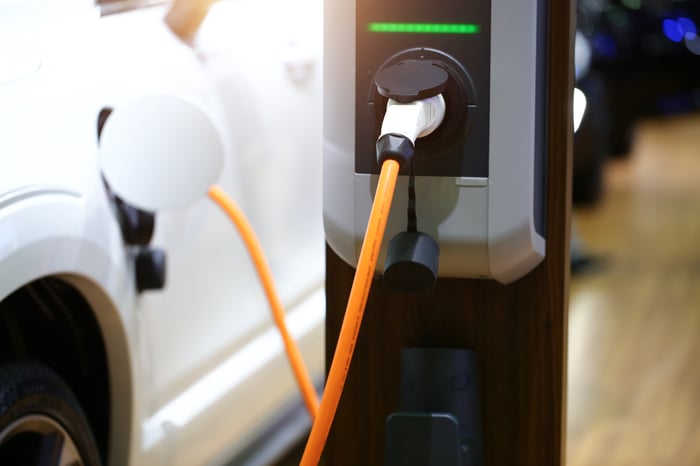If you've ever wondered why Berkshire Hathaway (BRK.A -0.25%) (BRK.B -0.65%) CEO Warren Buffett's name gets brought up so much on Wall Street, it's because of his impressive investing track record. Buffett isn't infallible, but he's delivered an annual average return of 20% since the mid-1960s for his shareholders. In aggregate, we're talking about a return of more than 2,800,000%!
What's even more amazing is that Buffett hasn't done anything the average investors couldn't do to net these huge gains. He focuses on a few sectors and industries that interest him, buys companies with clear-cut competitive advantages, and most importantly hangs onto those stakes for a very long time.
Another source of Buffett's success is concentration. The Oracle of Omaha doesn't believe diversification is necessary if you know what you're doing. This is readily apparent in Berkshire Hathaway's $302.6 billion investment portfolio. As of this past weekend, 85% of Berkshire's invested assets ($257.3 billion) were tied up in only 10 stocks.

Berkshire Hathaway CEO Warren Buffett. Image source: The Motley Fool.
1. Apple: $115.6 billion
Tech kingpin Apple (AAPL 0.70%) makes up about 38% of Warren Buffett's portfolio by itself and has been dubbed "Berkshire's third business" by the Oracle of Omaha. Apple offers some of the strongest branding in the world, is the clear leader in smartphones in the U.S., and has been pivoting to higher-margin services under the leadership of CEO Tim Cook. Though iPhone sales remain Apple's top product, services becoming a larger percentage of total sales will help remove the revenue lumpiness associated with new product launches.
2. Bank of America: $43.2 billion
Bank stocks have long been Buffett's favorite place to put Berkshire's money work. Bank of America (BAC -0.10%) is Berkshire's unquestioned largest bank holding, with more than 14% of invested assets. Bank of America has done an excellent job of controlling its noninterest expenses by consolidating branches and emphasizing digital banking. It's also in line to benefit more than any other money-center bank from an eventual rise in interest rates.

Image source: American Express.
3. American Express: $24.9 billion
Payment processor and lender American Express (AXP 0.09%) is Buffett's third-largest and third-longest-held stock. After 28 years of holding AmEx, Berkshire Hathaway's position has grown to almost $25 billion in value. This is a cyclical company that benefits from long periods of economic expansion, as well as its ability to attract affluent clientele. These well-to-do clients are less likely to change their spending habits when economic hiccups arise, which often means less worry about credit delinquencies for AmEx.
4. Coca-Cola: $22.5 billion
Speaking of long-tenured holdings, beverage behemoth Coca-Cola (KO -0.18%) is the longest-held stock in Buffett's portfolio (33 years). Coca-Cola operates in all but two countries worldwide (North Korea and Cuba) and has more than 20 brands generating at least $1 billion in annual sales. Thanks to its top-notch marketing team, it's also the best-known consumer goods brand. Coke has holiday tie-ins, has allied itself with well-known brand ambassadors, and is embracing digital advertising and social media as a way to get its message to a younger generation.

Image source: Getty Images.
5. Kraft Heinz: $14.1 billion
There's little question that Kraft Heinz (KHC -0.81%) is the oddball holding in Buffett's top 10. That's because Buffett admits to Heinz overpaying for Kraft Foods, and the combined company largely underperforming in recent years. This includes a greater than $15 billion goodwill writedown in 2019. While the pandemic has helped boost demand for packaged foods, Kraft Heinz's balance sheet is still bogged down by high debt levels and goodwill. In short, Berkshire Hathaway is sort of stuck with its 325.6 million shares.
6. Verizon Communications: $9.1 billion
Telecommunications giant Verizon (VZ -1.65%) is a fairly recent addition to Berkshire Hathaway's portfolio, although it's been bought hand over fist in the previous two quarters by Buffett and his team. The lure of Verizon is likely its 4.4% dividend yield, which is arguably one of the safest high-yield payouts on the planet. What's more, Verizon should benefit immensely from the rollout of 5G infrastructure. It's been a decade since the last major upgrade to download speeds, which suggests that a multiyear tech upgrade cycle will lead to higher-margin data consumption.

Image source: Getty Images.
7. U.S. Bancorp: $8.7 billion
Next to BofA, U.S. Bancorp (USB 0.64%) is Buffett's favorite bank stock. It's a company that regularly trades at a premium to its book value -- and for good reason. U.S. Bancorp has seen its users embrace technology, with the percentage of consumer loans completed digitally skyrocketing over the past two years. Being able to consolidate its physical branches, while also avoiding riskier derivative investments that have gotten U.S. money-center banks in trouble, has helped U.S. Bancorp to some of the highest return on assets among big banks.
8. Moody's: $8.5 billion
Credit agency and analytics company Moody's (MCO -0.16%) is yet another top-10 holding that's been held for longer than two decades. With an initial cost basis of just over $10, Berkshire Hathaway is sitting on an unrealized gain of better than 3,300% -- and this isn't accounting for dividends. Historically low lending rates have kept Moody's credit rating segment busy, while volatile trading markets are boosting demand for Moody's analytics. It's hard to envision Buffett ever selling this stake.

Image source: Getty Images.
9. BYD: $6.2 billion
Back in 2008, Buffett acquired 225 million shares of China-based electric-vehicle (EV) manufacturer BYD (BYDDY 1.68%) for $1.03 a share (it closed this past week at $27.65 a share). In March, BYD sold 16,301 EVs, which is more than higher-profile competitors NIO and XPeng delivered on a combined basis in the same month. With the Society of Automotive Engineers of China forecasting that half of all new vehicles sales in 2035 will be powered by alternative energy, BYD is in pole position to disrupt the largest auto market in the world.
10. DaVita: $4.4 billion
Rounding out the top 10 is kidney dialysis services company DaVita (DVA -0.39%). Buffett's fascination with the company is likely a numbers play. Over time, an aging U.S. population is going to become more reliant on kidney dialysis services for maintenance purposes. As the clear leader in providing these services, DaVita should see a steady uptick in demand and reimbursement for its services. This patient long-term thesis perfectly embodies the Buffett investing ethos.





